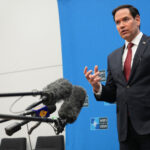Jewish groups warn that new Meta policies could worsen antisemitism
ADL CEO Jonathan Greenblatt: ‘The only winner here is Meta’s bottom line and as a result, all of society will suffer’

Justin Sullivan/Getty Images
A pedestrian walks in front of a new logo and the name 'Meta' on the sign in front of Facebook headquarters on October 28, 2021 in Menlo Park, California.
Jewish leaders warned on Tuesday that Meta’s new community-driven fact-checking system “will open the floodgates to content” that could target Jewish communities and individuals, calling the move a “step back” in the fight against rising antisemitism.
The warnings came in response to Meta CEO Mark Zuckerberg’s announcement yesterday, just days before President-elect Donald Trump takes office, that the social media giant is ending its third-party fact-checking program and replacing it with a community-driven system modeled after the community notes feature on Elon Musk’s X.
“The introduction of Meta’s new community notes feature must be approached with great caution,” Yfat Barak-Cheney, executive director of the World Jewish Congress Technology and Human Rights Institute, told Jewish Insider.
“Platforms like X and Wikipedia, which employ similar user-driven concepts, have demonstrated how easily misinformation and disinformation can be manipulated, and put the onus on the vulnerable communities to report and correct information online,” Barak-Cheney said. “In an online environment already marked by hostility, we are deeply concerned that the reduction of protections and clear guidelines will open the floodgates to content that fuels real-world threats, including violent acts targeting Jewish communities and individuals.”
Barak-Cheney said that at the same time, “the limitations of fact-checking systems, which have often been influenced by political biases, are far from ideal.”
Jonathan Greenblatt, CEO of the Anti-Defamation League, condemned the announced change, calling it a “step back” in addressing antisemitism.
“It is mind-blowing how one of the most profitable companies in the world, operating with such sophisticated technology, is taking significant steps back in terms of addressing antisemitism, hate, misinformation and protecting vulnerable and marginalized groups online,” Greenblatt said in a statement. “The only winner here is Meta’s bottom line and as a result, all of society will suffer.”
According to Meta, the relaxed guidelines aim to “allow more speech by lifting restrictions on some topics that are part of mainstream discourse.” Meta, the owner of Instagram and Facebook, simultaneously said that it plans to crack down on “high severity violations,” such as pro-terrorism content.
The updates “preserve a number of older restrictions that Meta has had in place for years,” Wired reported. The current version of the policy, according to Meta’s Community Standards, maintains prohibitions on Holocaust denials, Blackface and insinuations about Jewish people controlling financial institutions and the media. Meta also plans to keep the same policy about “protecting migrants, immigrants, and asylum-seekers” from what it characterizes as “Tier 1” or “most severe” attacks, such as content targeting people or groups of people based on their protected characteristics, according to Wired.
In a video speech early Tuesday morning, Zuckerberg cited the results of the 2024 U.S. presidential election as the underlying decision to move to a “community note” model, calling it a “cultural tipping point towards, once again, prioritizing speech.” Zuckerberg said that third-party moderators were “too politically biased” and it was “time to get back to our roots around free expression.”
“We’ve seen this approach work on X – where they empower their community to decide when posts are potentially misleading and need more context,” Joel Kaplan, Meta’s new chief global affairs officer, said in a statement. Kaplan, formerly a GOP political advisor who served in the George W. Bush administration and a longtime opponent of restrictions on political speech, was tapped last week to take over the role from former British Deputy Prime Minister Nick Clegg, less than a month ahead of Trump’s inauguration.
“Up until now, we have been using automated systems to scan for all policy violations, but this has resulted in too many mistakes and too much content being censored that shouldn’t have been,” Kaplan said. “So, we’re going to continue to focus these systems on tackling illegal and high-severity violations, like terrorism, child sexual exploitation, drugs, fraud and scams.”
Meta introduced its third-party fact-checking program in 2016, in the aftermath of Trump’s first win, as part of an effort to curb misinformation. In recent years — and particularly after Hamas’ Oct. 7 terrorist attack — Meta has struggled to effectively regulate antisemitism and other forms of hate speech on its platforms, sometimes removing legitimate posts from news outlets while allowing clear violations to remain. Meta fact-checking organizations (which included Soch Fact Check, AFP and AAP, among others) sometimes made false allegations, for example Soch’s claim that Jewish students were not locked inside the library at Cooper Union College during an anti-Israel protest in October of last year.
According to the ADL, “Meta platforms responded to exactly zero cases of antisemitic content when reported as average users.”
“If all of this is the direction Meta is heading in 2025, it is a bad sign of what is to come for Jews and all marginalized people on their platforms,” the ADL Center for Technology and Society said in a statement.
Barak-Cheney was slightly more optimistic. “Meta has made important strides in recent years to make its platforms safer, and it is critical that this work continues,” she said. “Rolling back these efforts risks undoing hard-won progress at a time when vigilance against online hate and antisemitism is needed more than ever.”

















































